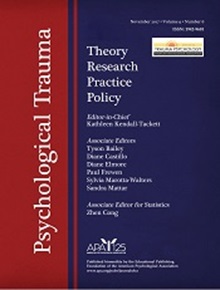情绪失调与创伤后应激症状的严重程度:特异性情绪诱导后皮质醇反应性的影响。
IF 2.7
2区 心理学
Q2 PSYCHIATRY
Psychological trauma : theory, research, practice and policy
Pub Date : 2024-09-09
DOI:10.1037/tra0001786
引用次数: 0
摘要
目的情绪失调在创伤后应激症状(PTSS)的病因和维持中起着核心作用。对情绪唤起事件的生理反应的个体差异可能会影响这种关联的强度。本研究的目的是测试在完成特异性情绪诱导任务后皮质醇的反应性是否会调节情绪失调与 PTSS 严重程度之间的关系。方法参与者为 94 名目前正遭受亲密伴侣暴力并使用药物的社区女性(年龄:M = 40.5 岁;35.2% 为黑人;61.5% 为失业者)。PTSS 严重程度在基线时通过临床医生主持的诊断访谈进行评估。参与者在基线时提供了一份情绪失调的自我报告。结果发现,情绪失调与皮质醇反应性之间存在显著的交互作用(b = 0.18,p = .02)。结论研究结果提供了新的证据,证明情绪诱发刺激后,情绪失调和皮质醇反应性(下丘脑-垂体-肾上腺系统轴应激反应性的指标)的相互作用与 PTSS 的严重程度有关。这项研究提供的信息可能有助于确定哪些人最有可能患上更严重的创伤后应激障碍。未来的工作需要在受创伤影响的不同人群(如退伍军人、男性)中复制研究结果。(PsycInfo Database Record (c) 2024 APA,保留所有权利)。本文章由计算机程序翻译,如有差异,请以英文原文为准。
Emotion dysregulation and posttraumatic stress symptom severity: The influence of cortisol reactivity following idiographic emotion inductions.
OBJECTIVE
Emotion dysregulation plays a central role in the etiology and maintenance of posttraumatic stress symptoms (PTSS). Individual differences in physiological responses to emotionally evocative events may influence the strength of this association. The objective of this study was to test whether cortisol reactivity following idiographic emotion induction tasks moderated the relation between emotion dysregulation and PTSS severity.
METHOD
Participants were 94 community women currently experiencing intimate partner violence and using substances (age: M = 40.5 years; 35.2% Black; 61.5% unemployed). PTSS severity was assessed at baseline via a clinician-administered diagnostic interview. Participants provided a self-report of emotion dysregulation at baseline. Samples of salivary cortisol were collected pre-, during, and postidiographic emotion inductions during an experimental session.
RESULTS
A significant emotion dysregulation by cortisol reactivity interaction was found (b = 0.18, p = .02). Emotion dysregulation was related to PTSS severity for those with high (b = 0.13, p < .001), but not low (b = -0.001, p = .99), levels of cortisol reactivity following idiographic emotion inductions.
CONCLUSIONS
Findings provide novel evidence of the interplay of emotion dysregulation and cortisol reactivity, an indicator of hypothalamic-pituitary-adrenal system axis stress reactivity, following emotionally evocative stimuli in relation to PTSS severity. Information from this study may help to identify individuals who are at highest risk of more severe PTSS. Future work is needed to replicate findings among diverse populations impacted by trauma (e.g., veterans, men). (PsycInfo Database Record (c) 2024 APA, all rights reserved).
求助全文
通过发布文献求助,成功后即可免费获取论文全文。
去求助
来源期刊
CiteScore
11.20
自引率
3.20%
发文量
427
期刊介绍:
Psychological Trauma: Theory, Research, Practice, and Policy publishes empirical research on the psychological effects of trauma. The journal is intended to be a forum for an interdisciplinary discussion on trauma, blending science, theory, practice, and policy.
The journal publishes empirical research on a wide range of trauma-related topics, including:
-Psychological treatments and effects
-Promotion of education about effects of and treatment for trauma
-Assessment and diagnosis of trauma
-Pathophysiology of trauma reactions
-Health services (delivery of services to trauma populations)
-Epidemiological studies and risk factor studies
-Neuroimaging studies
-Trauma and cultural competence

 求助内容:
求助内容: 应助结果提醒方式:
应助结果提醒方式:


